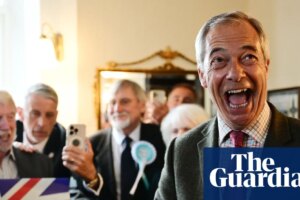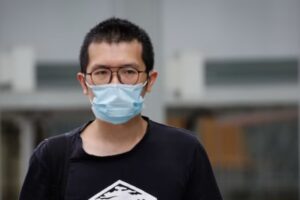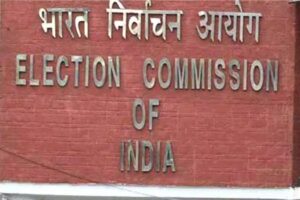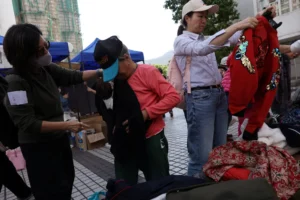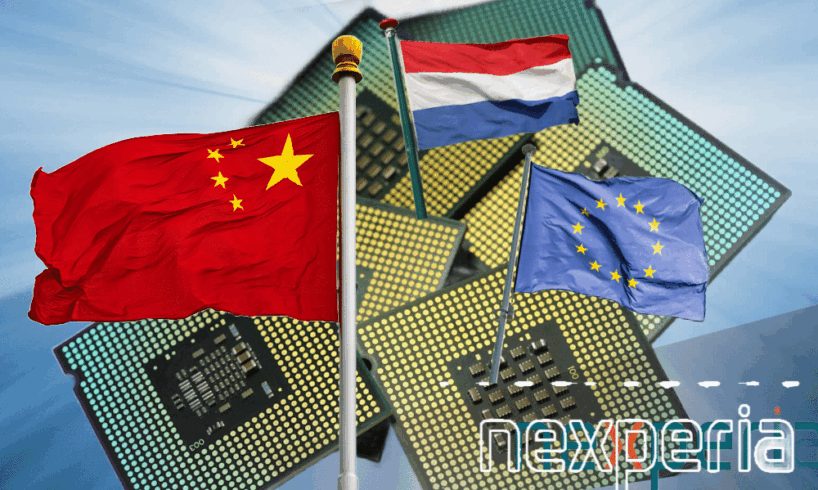
🔥 This is premium content and also appeared in the Weibo Watch newsletter. Subscribe to stay in the loop.
On the evening of October 12, while the Netherlands vs. Finland World Cup qualifier became a hot topic on Weibo (#荷兰4比0芬兰#), something else entirely made headlines — not about goals, but about chips.
Chinese company Wingtech Technology (闻泰科技) issued a statement saying that the Dutch government, citing national security concerns, had imposed global operational restrictions on Nexperia (安世半导体), a Dutch semiconductor company based in Nijmegen that has been wholly owned by the Chinese Wingtech conglomerate since 2019.
The Dutch government reportedly ordered a one-year freeze on strategic and governance changes across Nexperia on September 30, but the news only went trending on Chinese social media after Wingtech revealed the suspension (the topic became no 1 on Toutiao on Sunday).
Wingtech said that Nexperia’s Chinese CEO, Zhang Xuezheng (张学政), was also suspended, and that an independent, non-Chinese director was appointed who can legally represent the company.
That was ordered by a Dutch court following internal upheaval — Nexperia’s Dutch and German executives, including Legal Chief Ruben Lichtenberg, CFO Stefan Tilger, and COO Achim Kempe, filed a petition with the Dutch Enterprise Chamber requesting emergency measures to suspend Zhang and place the company’s shares under temporary court management. The court agreed (also see the Pekingnology newsletter by Zichen Wang, who was among the first to report on this issue).
The next day, on October 13, Dutch newspapers reported on the freeze, describing it as a rare move. NRC called it “an emergency measure intended to prevent chip-related intellectual property from leaving the country,” adding that, according to insiders, “there were indications that Nexperia was planning to transfer chip know-how to China.”
The Dutch government later clarified that the so-called Goods Availability Act (Wet Beschikbaarheid Goederen) was applied “following recent and acute signals of serious governance shortcomings and actions within Nexperia,” to protect Dutch and European economic security and safeguard crucial technological knowledge.
That specific law dates back to the Cold War era of 1952 and, according to Pim Jansen, professor of economic administrative law at Erasmus University Rotterdam, has never been invoked before. (Due to the unique situation, Jansen almost wanted to dub it the “Nexperia law.”)
🇳🇱 Nexperia (安世半导体) is a spin-off from chipmaker NXP, which in turn originated from Royal Philips. The company produces basic semiconductors that are used everywhere, from phones to cars. Since becoming independent in 2017, its headquarters in Nijmegen has expanded from about 150 to nearly 500 employees. Across its production sites in Germany, the UK, and Asia, Nexperia employs more than 10,000 people.
🇨🇳 Wingtech Technology (闻泰科技) is a major Chinese tech conglomerate listed on the A-share market and based in Jiaxing, combining two core businesses: semiconductors and electronics manufacturing. The company started in 2005 as a smartphone design and assembly firm (ODM) serving brands such as Xiaomi, Samsung, and Lenovo, and has since become one of the world’s largest mobile device manufacturers.
The recent developments are a big blow to Wingtech, as it basically means won’t be able to control day-to-day decisions at its most valuable subsidiary.
According to Wingtech, the suspension is politically motivated rather than fact-based and constitutes a serious violation of the market economy principles, fair competition, and international trade rules that the EU itself advocates.
The Wider Tech War Context
The Nexperia news is not an isolated case – it comes at a time when many things are happening at once.
🧩 On October 1, Dutch media reported that, due to tightening export rules announced by the United States, no American parts or software can be sold to Nexperia without a US license anymore because Nexperia’s Chinese parent company, Wingtech, is already on the American “Entity List,” and all of the company’s subsidiaries now also fall under the extended US export restrictions that took effect on September 29.
🧩 According to a Dutch media report on October 2, Nexperia said it strongly disagreed with the new export restrictions and was working on measures to limit their impact on its operations.
🧩 Barely two weeks prior, on September 18, China banned its tech companies from buying Nvidia AI chips from the American Nvidia, citing antitrust and national security reasons.
🧩 As of October, China also added several prominent Western companies to its Unreliable Entity List, including the Canadian-based research firm TechInsights.
🧩 And, as if that all wasn’t enough, China dramatically expanded its rare earth export controls on Thursday, expected to have a direct impact on the global semiconductor supply chain, while President Trump announced 100% tariffs on all Chinese imports and new export controls on “any and all critical software.”
👉 Regardless of how directly all these events are connected to what has happened in the Netherlands, one thing is clear: the global tech war is intensifying, with control over the semiconductor ecosystem now a top strategic priority.
And whatever the exact reasons or details behind the freeze of Nexperia’s strategic operations, on Chinese social media the move is being framed within a broader narrative — that of Western containment aimed at curbing China’s rapid rise as a global technological power.
Chinese Social Media Responses
On Chinese social media, commentators are denouncing the Netherlands.
One finance-focused Weibo blogger (@董指导挤出俩酒窝) wrote:
💬✍️ “By 2024, Nexperia contributed 14.7 billion RMB (2 billion U.S. dollars) in revenue and nearly 40% gross profit margin [to the Dutch economy]. According to Wingtech’s data, it also paid 130 million euros in corporate income tax to the Netherlands (..) This should have been a textbook case of mutual success – Chinese capital brought markets and vitality; the Netherlands benefited from taxes and employment; technology continued to grow in value within the global supply chain. Yet the Netherlands, showing its “pirate spirit”, destroyed this successful example with its own hands..”
That sentiment — that the Netherlands is treating China unfairly despite Chinese contributions to the Dutch economy and business — was echoed across social media. On the Q&A platform Zhihu, some users called it “a dramatic story”:
💬✍️ “Wingtech spent hundreds of billions of yuan to acquire a long-established European semiconductor company, thinking it had finally gained access to core global technology. But before long, others pulled the rug out from under them, right in front of the whole world.”
Commenter Yan Yaofei (晏耀飞) said:
💬✍️ “It’s like you bought a cow and keep it in someone else’s barn — you tell them how to feed and use it, and they have no right to interfere. Then suddenly, they lock you out of the barn entirely. It basically can be classified as robbery, openly and shamelessly.”
Another Weibo commenter (@就是赵老哥) wrote:
💬✍️ “It feels like the Netherlands is making a fuss. Back then, they sold us a loss-making company and now they’re backing out. This will have a big impact on the semiconductor sector. Foreign companies are unreliable, even when you buy their companies, they’re still unreliable. Domestic substitution is the only way forward.”
Alongside mistrust toward the West and perceptions that the Netherlands has treated China unfairly, even betraying it, many online discussions also frame the move as part of a broader political provocation. At the same time, a recurring theme on social media is the belief that China must strengthen its domestic semiconductor industry.
Finance blogger Tengteng’s Dad (@腾腾爸) wrote:
💬✍️ “The Dutch government’s freezing of the shares of Wingtech Technology’s Dutch subsidiary reminds me of the Ping An–Fortis incident years ago. Europe hasn’t changed, it’s still the same shameless Europe. It’s just that my fellow countrymen have thought too highly of them, thanks to all those “public intellectuals” who have spent years diligently promoting their Western masters. Now, more and more Chinese people are opening their eyes. In the future, all that Western talk about democracy, rule of law, and freedom will completely lose its appeal in China.”
Chinese Narratives of Europe
The online reactions to the Nexperia incident echo broader Chinese narratives about Europe that have been circulating in the digital sphere for the past decade.
Last Thursday, the topic of Chinese narratives of Europe happened to be the main theme of a panel I joined during the ReConnect China Conference in The Hague, hosted by the Clingendael China Centre (event page).
In preparation for this event, I focused mostly on the social media angle of these narratives. I looked at hundreds of trending topics related to Europe from different Chinese platforms—from Kuaishou to Weibo—with a dataset of nearly 100 pages filled with hashtags that went viral over the past twelve months (October 2024–October 2025), to see what themes dominate discussions about Europe in China’s online sphere.
Excluding sports-related topics (which account for about 35–40% of all high-ranking posts about Europe; sports apparently are the best diplomacy tools, after all), the top 250 non-sports topics reveal a clear image of how Europe is perceived in Chinese digital discourse today.
A brief overview:
🟧 1. Energy, Russia, Sanctions, War, Security (≈ 38%)
🔍 Main Focus: Russia–Ukraine war, Europe’s energy crisis, loss of autonomy, European geopolitical vulnerability and dependence on the United States
💡 Main Theme: Europe is often portrayed as lacking strategic autonomy and bearing the heavy costs of decisions driven by Washington’s agenda. It is viewed as vulnerable and “losing out” (吃亏), strategically outmaneuvered & excluded from major geopolitical decision-making.
🟧 2. Economy, Trade, Technology (≈ 21%)
🔍 Main Focus: ASML, tensions over electric vehicles (EVs) and protectionism, supply chains, trade deficits, and deindustrialization
💡 Main Theme: Europe’s trade frictions with China are portrayed as symptoms of Western decline and hypocrisy. The main story is that Europe’s economy is stagnating partly due to being overly protectionist and dependent on the US, while China emerges as a more dynamic and vital global player. Europe is losing competitiveness while China rises as a tech innovator.
🟧 3. EU Politics and Governance (≈ 13%)
🔍 Main Focus: Internal EU divisions, populism, leadership crises, and Europe’s political rightward shift (右倾)
💡 Main Theme: The EU is depicted as disunited and inefficient, struggling to respond to global challenges. The focus is on its inability to achieve strong, unified leadership amid political instability and ideological fragmentation.
🟧 4. Society, Migration, Crime (≈ 11%)
🔍 Main Focus: Social instability, migration, public safety, and racial or cultural tension
💡 Main Theme: Europe is seen as unsafe, chaotic, and socially divided. This is often contrasted with China’s image of order and security.
🟧 5. Culture, History, Sino-European Relations (≈ 10%)
🔍 Main Focus: Cultural comparisons, debates on values, and reflections on historical ties
💡 Main Theme: While Europe is respected for its rich cultural heritage and moral legacy, it is also mocked for its perceived sense of moral superiority. Europe stands for the past glory of civilization, not its future.
🟧 6. Lifestyle, Tourism, Memes (≈ 7%)
🔍 Main Focus: Chinese tourism in Europe, theft incidents, travel diaries, humorous cross-cultural comparisons, and the growing sentiment of being “suddenly disillusioned with Europe” (对欧洲祛魅了)
💡 Main Theme: Europe remains a popular travel destination, but the online tone has shifted from overwhelming admiration to a more pragmatic and critical perspective. The image of Europe is now more “de-romanticized,” with some even suggesting that “getting robbed is part of the experience” [of traveling in Europe] (I previously wrote about that here).
From Chips to Goals
So what does this all tell us?
Beyond the idea that Europe—caught between Washington and Moscow—lacks the agency to handle external crises while also struggling with internal division and decline, the dominant Chinese narrative about Europe is actually not about Europe at all.
‘Europe’ is all about China. Representations of Europe—from “democratic disillusion” to danger, disorder, and dependency—serve as both a mirror and a warning against which Chinese social, political, and national narratives are contrasted: chaos vs. order, fragmentation vs. unity, vulnerable dependency vs. strategic autonomy, decline vs. rise, etc. etc.
Something that the hashtags don’t tell us as much, but is still very much alive as well, is that Europe is also still seen as a major market of opportunities and a crucial soft power frontier for China.
Europe’s future, therefore (and for other reasons), matters to China—not as a model to follow, but as a stage for Chinese cultural and economic influence, where Chinese products, culture, and ideas can shape global appeal.
Perhaps that’s also what gives the Nexperia incident its extra weight: it ties together multiple narratives. Europe is seen as overly protectionist, biased against China, and driven by Washington’s agenda — and the fact that former Dutch Prime Minister Mark Rutte, now NATO Secretary-General, once called US President Trump “daddy” fits into that perception. As some Weibo commenters joked: “Did their daddy make them do it?”
In the end, the takeaway for many commenters is that the incident serves as another “wake-up call for China”: a stark reminder of the need for technological self-reliance. And so, the discussion unfolds in such a way that, once again, it becomes more about China than about Europe — about China’s international strategies, its global rise, and the lessons to be learned, with the Netherlands as the current antagonist.
Thankfully, there was something to celebrate as well: the Netherlands won 4-0 in the popular match against Finland. Amidst all the talk about trade and tech, one popular sports blogger on Weibo vividly wrote about how the Dutch attack was in full force, about how all-time top scorer Memphis Depay led the offense brilliantly, how he helped the team secure a victory, and how the Netherlands “took control of their own destiny in the race to top the group.”
Whatever the future holds for Nexperia and the geopolitical drama surrounding it, at least we can count on the unifying power of football — where, even if only for 90 minutes, chips sit on the bench and netizens far apart in politics cheer for each other’s countries.
I’m not even an avid football fan, but suddenly, the 2026 World Cup (still months away) can’t come soon enough.
By Manya Koetse
(follow on X, LinkedIn, or Instagram)
Spotted a mistake or want to add something? Please let us know in comments below or email us. First-time commenters, please be patient – we will have to manually approve your comment before it appears.
©2025 Whatsonweibo. All rights reserved. Do not reproduce our content without permission – you can contact us at info@whatsonweibo.com.
